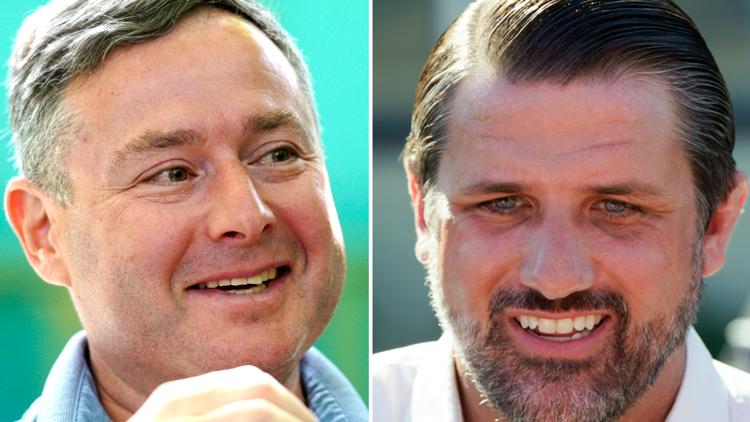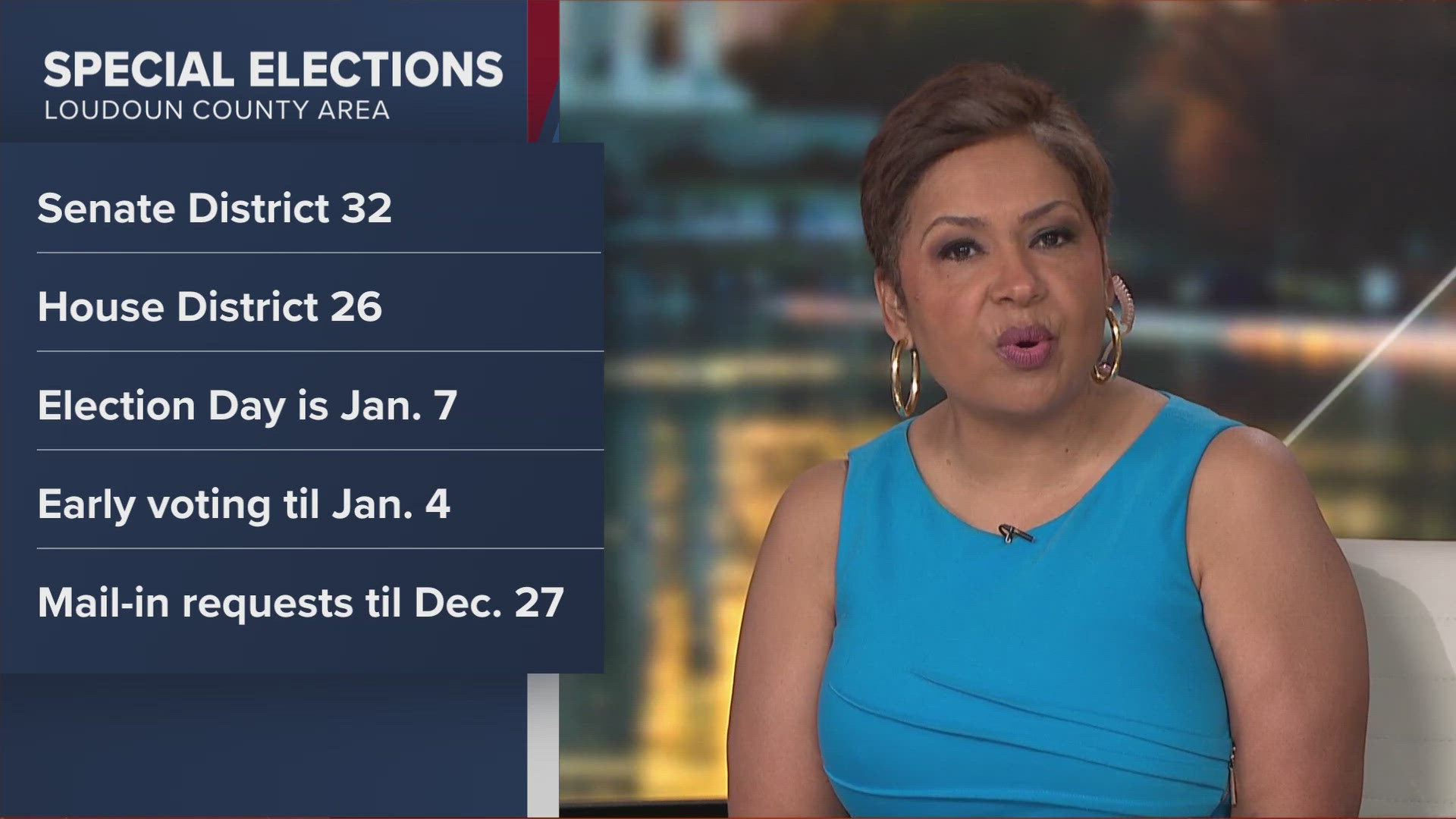FREDERICKSBURG, Va. — The candidates to represent Virginia’s 7th Congressional District both say democracy is in trouble.
Republican Derrick Anderson and Democrat Eugene Vindman each make the case that the government has failed voters in the district and across the country as leaders embrace extreme politics. In this year's election, they say, the country's future is on the line.
And that's pretty much where their messages diverge.
Anderson, a former Army Green Beret, pitches himself as an affable candidate who can bring people in the district where he grew up together with simple competence.
“At the end of the day, I think people are just ready for somebody to just govern — go get things done in Washington, D.C., and stop breathing fire,” he said in an interview.
Yevgeny “Eugene” Vindman rose to national prominence after helping his brother blow the whistle against President Donald Trump for pressuring Ukrainian officials to investigate the Biden family. The former Army colonel sees a different threat: Trump himself.
“Some people have forgotten about this issue — others have not, and it’s just a mix in the district,” Vindman said of the scandal that led to Trump’s first impeachment. “But I think, in the context, that this is not ancient history. Why? Because Donald Trump is now the major party nominee.”
For months, Vindman, 49, and Anderson, 40, have been entrenched in a vote-by-vote crunch in their fast-growing district, where veterans make up about 12% of the population. The two Army veterans never before elected for public office are vying for the House seat after Rep. Abigail Spanberger, a moderate Democrat, declined to seek reelection so she could run for governor.
In a competitive race, both have mostly followed their parties’ playbooks. Anderson has stressed the economy and immigration, while Vindman emphasizes abortion rights and fending off extremism.
But Vindman and Anderson's perspectives also reflect two distinct strains of voter anxiety about American democracy. And in a deeply divided nation, voters' choices could impact not just the 7th District but control of Congress.
Democrats hope to cement their hold on the district, which Republicans represented for nearly 50 years until Spanberger flipped the seat in 2018. For conservatives, the race is an opportunity to pick up a seat in a matchup with no incumbent.
Stephen Farnsworth, a University of Mary Washington political science professor, said it's Virginia's most competitive race.
“There’s a lot of national interest in the Virginia 7th, and it is the sort of district where congressional majorities are won and lost,” he said. “If you can’t win the outer-ring suburban counties of big cities in America, then you’re not going to be in the House majority.”
Democracy is central to the race in part because it’s the bedrock of Vindman’s national profile.
In campaign videos and on the trail, he has described the episode that led him to blow the whistle on Trump as his call to serve a democracy “unbroken, but not unblemished.” He said it inspired him to run.
While he was serving as an ethics lawyer at the White House in 2019, Vindman's twin brother Alexander told him about a phone call in which Trump pressured Ukrainian President Volodymyr Zelenskyy to investigate now-President Joe Biden and his son, Hunter. The brothers, career Army officials who came to the U.S. as toddlers after emigrating from Ukraine, raised their concerns with others. The alarm they sounded soon became the heart of Democrats’ first impeachment inquiry into Trump.
In 2020 they were fired, and the Department of Defense's inspector general later said Eugene Vindman had likely faced retaliation. He was reassigned to the Army until his retirement in 2022.
Despite the scandal, Vindman said he did not have a vendetta.
"It’s actually highlighting that a major party nominee — the potential president of the United States — did these things,” he said.
His high-profile past set Vindman apart in a crowded primary, where he was a newcomer in a pool of career politicians. The impeachment also helped him raise campaign money — he had nearly $3 million in the bank at the end of September, compared to Anderson's $1 million. More than half of the $9 million Democrats have spent on general election ads has come directly from Vindman’s campaign account, while Anderson has depended heavily on Republican outside groups.
Yet in a diverse district with a sliver of independent voters spanning Washington exurbs to the foothills of the Blue Ridge Mountains, the race is tight. Vindman’s ties to Trump’s impeachment could impact his ability to sway moderate voters.
Anderson, meanwhile, is attempting to gain those votes by painting Vindman as a partisan Democrat. Along with his criticisms of Vindman’s military rank and record, Anderson has said the liberal candidate's unique history with the former president should cost him.
“He thrives on divisiveness because he’s focused on his past — his revenge toward President Trump — while we’re focused on the future,” Anderson said.
Vindman thinks voters will respect his actions.
“Moral courage is something rare and the most valuable of traits," Vindman said. “That’s where there’s the biggest difference between myself and Mr. Anderson.”
The race has had its share of turmoil, including a campaign photo Anderson sent out in which he posed with a woman and her three daughters. To some, it may have looked like a family photo, except that the people with him weren't his family.
Vindman said Anderson was “trying to fool the voters in the district about his fake family” after the photo surfaced in The New York Times. Anderson blasted Vindman for dragging the local family through the mud, insisting that he used the photo not to deceive anyone but to celebrate community ties.
A more formidable challenge for Anderson may be navigating a ticket with Trump at the top.
In a district that's home to roughly 60,000 federal workers, Anderson is fending off questions about Trump's pitch to relocate 100,000 government employees from the Washington area. His team has said he opposes the idea.
Trump has underperformed in the district compared to fellow Republicans. Under its redrawn boundaries, voters backed Biden by seven points in 2020, data show, whereas Republican Gov. Glenn Youngkin won by roughly five points.
“Trump is not popular in Northern Virginia,” said Bob Holsworth, a Richmond-based political analyst. “The challenge of any Republican candidate in No-Va is that Trump is a person who came in and said he wanted to drain the swamp."
Spending more than twice as much as Republicans on ads, Democrats have emphasized Anderson's ties to Trump. Vindman himself has repeatedly flamed Anderson for running a campaign “bankrolled by MAGA extremists,” tethering him to Trump’s “Make America Great Again” platform. But Anderson, whom Trump endorsed, has vowed to be an independent voice in Congress.
“When I was overseas in the military, it didn’t matter if you were Republican, a Democrat — your race, color, your religion,” Anderson said. “We were all on the same team, and we all had a mission.”
Still, Vindman said Trump, and those who supported him, deepened fissures in America rather than mending them.
“If Democrats,” Vindman began to say.
He paused, considering his words.
“If democracy wins this next election, then we’re going to have a lot of rebuilding to do."
___
Associated Press writer Gary Fields in Quantico, Virginia, contributed to this report.
___
Olivia Diaz is a corps member for The Associated Press/Report for America Statehouse News Initiative.



